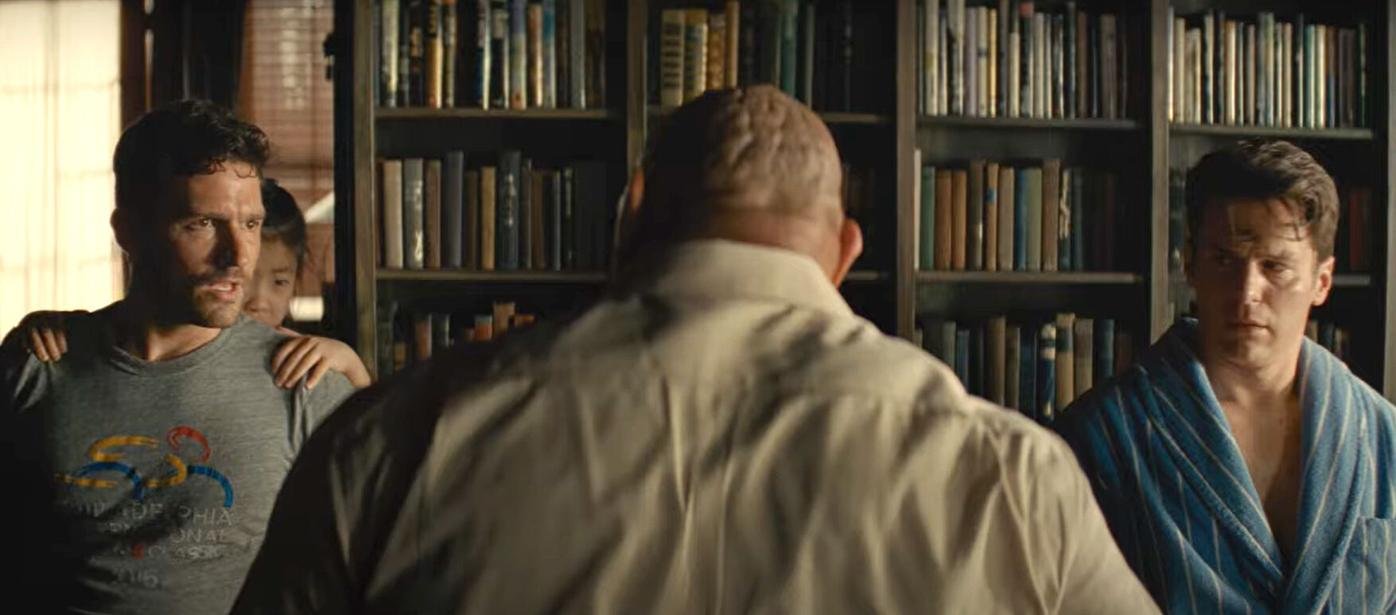Tense thriller KNOCK AT THE CABIN sees Shyamalan returning to fertile thematic ground
Knock at the Cabin
Directed by M. Night Shyamalan
Written by M. Night Shyamalan, Steve Desmond, Michael Sherman
Starring Dave Bautista, Jonathan Groff, Ben Aldridge
Rated R
Runtime: 1 hour, 40 minutes
In theaters February 3
by Ryan Silberstein, Managing Editor, Red Herring
While I love watching and learning about older films and filmmakers, there is something uniquely exciting about following the career of a writer-director as they develop over the course of their career. Perhaps even more when that career has as many ups and downs as M. Night Shyamalan’s. I’ve been following him since The Sixth Sense, dropped off after The Last Airbender, and came back with Split. I have not loved all of his movies, though I have a fierce appreciation for the ones I love. Especially being a lifelong Philadelphian, a new M. Night movie is an Event (with mild apologies to Wayward Pines and Servent, because I am just not good at watching television).
A family vacation at a remote Pennsylvania cabin is interrupted by four strangers. It begins when Leonard (Dave Bautista) walks out of the woods and helps a small girl, Wen (Kristen Cui) catch some grasshoppers for observation. Soon, Leonard, the de facto leader of the group, is politely asking Wen’s two dads, Eric (Jonathan Groff) and Andrew (Ben Aldridge), to be let into the cabin to discuss an urgent matter. As the situation escalates, Leonard and his compatriots, Sabrina (Nikki Amuka-Bird), Adriane (Abby Quin), and Redmond (Rupert Grint) bind the couple to chairs and explain that they must make the ultimate sacrifice in order to prevent the imminent end of the world, based on a vision that the foursome have shared.
One of the throughlines of Shyamalan’s work is wrestling with faith, going all the way back to his first feature, Praying With Anger. His characters often struggle with their beliefs, not with religion as a formalized practice, but in how they believe the world works. When I was attending Catholic schools in my youth, like Shyamalan, whenever a student questioned the faith or some aspect of Jesus, the teacher would immediately bring up the story of Doubting Thomas. After Jesus' resurrection, he refused to believe that he had returned from the dead until he was able to see the nail holes and the gash in Jesus’ side for himself. Jesus admonishes him for needing to see to believe, and tells the Apostles that those who are able to believe without seeing are blessed. What we have, millennia after the death of Jesus, was real faith, the teachers would tell us. But belief without evidence seems more impossible the more you are told to believe it.
Faith is at the forefront of Shylaman’s most successful work, like The Sixth Sense and Unbreakable, becoming most literal in Signs. Faith also plays an important role in The Village and Lady in the Water. In those films, like Unbreakable, the characters must choose whether or not to believe the stories they are being told. In all of these cases (spoilers), those stories contradict the world as we know it. David Dunn doesn’t believe superheroes are real, until he can test it empirically himself, but he wouldn’t even get that far without Mr. Glass pushing him–David doesn’t even realize he’s never been sick until he’s asked. In The Village, the residents of Covington don’t question the Elders. Lady in the Water is closest to how faith manifests in Knock at the Cabin but with an entire apartment complex.
Prior to Knock, the protagonists in these stories use some version of the scientific method to test the claims made by believers. This is one reason why I think Shyamalan’s films often get pulled apart by plot hole truthers, because those who watch with that mindset are looking for ways to outsmart the movie. But Shyamalan is far more interested in how these characters change their worldview on an emotional level. He’s not creating puzzles to be solved but pushing those within his stories to alter their convictions and to convince themselves. To find faith in believing or in refuting what is being told. The setting of Knock turns this from a journey of self-discovery into a broiler. A remote cabin with no phone service, no way for the characters to prove whether news reports of the escalating apocalypse they are being told about is real or a hoax until it will be too late to turn back.
Structuring the story this way, either by the screenwriters or by Paul G. Tremblay in the novel the movie is based on, The Cabin at the End of the World, makes this one of the great “what would you do?” stories. Not only does it take on aspects of the home invasion genre, with potential escapes, but even the way Eric and Andrew handle conversations with Leonard and the others. There’s so much to be gained in the viewing experience from a bit of introspection, and the tension throughout is masterful, as are the flashbacks to Eric and Andrew’s life together before the vacation, providing more character detail as well as dialing back the tension to give the audience a chance to breathe and reset for when it cuts back and the suspense starts again. The shot composition is less experimental than Shyalaman used in Old, but he deploys extreme closeups, the character faces filling the frame, adding to the suspense because the only sources of information for much of the story are the people in the room. It pushes the feeling of sincerity through the composition. Eric and Andrew have every reason to doubt Leonard and the others, so they (and the audience) need to be pushed into opening our minds to doubt. We know this can’t possibly be real, but what if it is? The stakes here are clear and directly challenging the characters.
None of this would be possible without the actors’ performances to carry it, and while Shyamalan isn’t always thought of as an actor’s director, he excels at capturing intimate performances in heightened settings. Dave Bautista, definitively the best wrestler-turned-actor of all time, is perfect for this role. His physicality makes him an obviously imposing presence, but Bautsta uses his innate tenderness and softens his voice even more than usual, making him a captivating juxtaposition, and a sympathetic character when he absolutely should not be so. While it may seem like Jonathan Groff and Ben Aldridge have less to do on the surface, they both convey so much emotion and thought processing through just their facial expressions.
It can be easy to mistake earnestness for seriousness, but there’s a playful side to Shyamalan that has become more prominent and made this recent run that much more enjoyable. It is one of the reasons why Knock at the Cabin is a great entry into Shyamalan’s uneven filmography. It’s tense, scary, and provocative as long as you are willing to engage within its premise as earnestly as it is laid out, and I honestly had a great time fidgeting in my seat as the tension increased over the runtime. His last four pictures have all worked well to varying degrees for me, and Knock also feels like a return to his classical composition style from his earlier work, while also bringing the lessons he learned from the “B movies” he’s been digging away at since back-to-back big budget busts Airbender and After Earth. While my faith in him as a filmmaker has been shaken over the years, I am back to being a believer.


